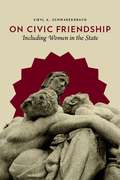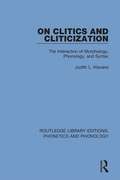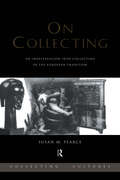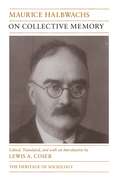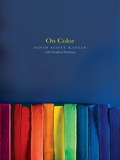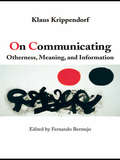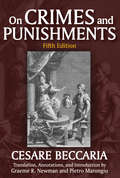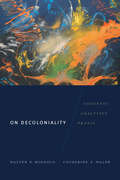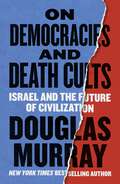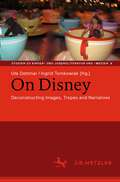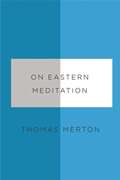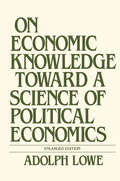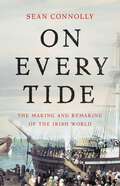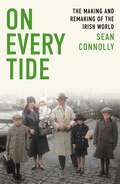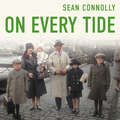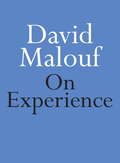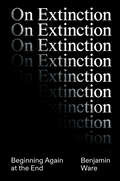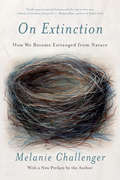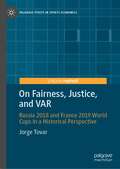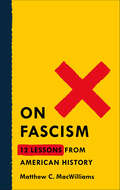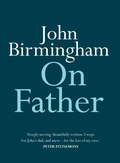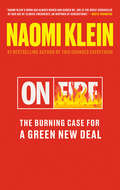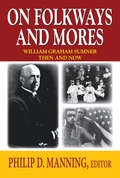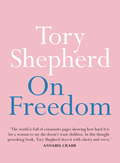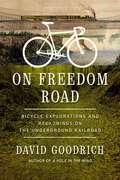- Table View
- List View
On Civic Friendship: Including Women in the State
by Sibyl SchwarzenbachWomen have performed the vast majority of often unpaid friendship labor for centuries. Embodying the freedom, equality, and ideals of the Constitution, civic friendship emerges as a necessary condition for genuine justice. Through a critical examination of social and political relationships from ancient times to today, Sibyl Schwarzenbach develops a truly innovative, feminist theory of the democratic state. Beginning with an analysis of Aristotle's notion of political friendship, Schwarzenbach brings the philosopher's insights to bear on the social and political requirements of the modern state. She elaborates a conception of civic friendship that, with its ethical reproductive praxis, functions differently from male-centered notions of fraternity and, with its female participants, remains fundamentally separate from generalized, male-inflected claims of Marxist solidarity. Schwarzenbach also distinguishes civic friendship from feminist calls for public care, arguing that friendship, unlike care, not only is reciprocal but also seeks to establish and maintain equality. Schwarzenbach concludes with various public institutions-economic, legal, and social-that can promote civic friendship without sacrificing crucial liberties. In fact, women's entrance into the public sphere en masse makes such ideals realistic within a competitive, individualistic society.
On Clitics and Cliticization: The Interaction of Morphology, Phonology, and Syntax (Routledge Library Editions: Phonetics and Phonology #13)
by Judith L. KlavansFirst published in 1995. This investigation shows that cliticization is not a totally unified phenomenon. Asymmetries in the behaviour of phonological and syntactic clitics show that no single principle predicts all clitic behaviour. The study explores the idea that modifications to the original five parameter system of analysis can be altered to a more efficient analysis in terms of three parameters. This title will be of interest to students of phonetics and phonology.
On Collecting: An Investigation into Collecting in the European Tradition
by Susan PearceOn Collecting examines the nature of collecting both in Europe and among people living within the European tradition elsewhere.Susan Pearce looks at the way we collect and what this tells us about ourselves and our society. She also explores the psychology of collecting: why do we bestow value on certain objects and how does this add meaning to our lives? Do men and women collect differently? How do we use objects to construct our identity?This book breaks new ground in its analysis of our relationship to the material world.
On Collective Memory (The Heritage of Sociology)
by Maurice HalbwachsHow do we use our mental images of the present to reconstruct our past? Maurice Halbwachs (1877-1945) addressed this question for the first time in his work on collective memory, which established him as a major figure in the history of sociology. This volume, the first comprehensive English-language translation of Halbwach's writings on the social construction of memory, fills a major gap in the literature on the sociology of knowledge.Halbwachs' primary thesis is that human memory can only function within a collective context. Collective memory, Halbwachs asserts, is always selective; various groups of people have different collective memories, which in turn give rise to different modes of behavior. Halbwachs shows, for example, how pilgrims to the Holy Land over the centuries evoked very different images of the events of Jesus' life; how wealthy old families in France have a memory of the past that diverges sharply from that of the nouveaux riches; and how working class construction of reality differ from those of their middle-class counterparts. With a detailed introduction by Lewis A. Coser, this translation will be an indispensable source for new research in historical sociology and cultural memory. Lewis A. Coser is Distinguished Professor of Sociology Emeritus at the State University of New York and Adjunct Professor of Sociology at Boston College.
On Color
by David Kastan Stephen FarthingOur lives are saturated by color. We live in a world of vivid colors, and color marks our psychological and social existence. But for all color’s inescapability, we don’t know much about it. <P><P>Now authors David Scott Kastan and Stephen Farthing offer a fresh and imaginative exploration of one of the most intriguing and least understood aspects of everyday experience. Kastan and Farthing, a scholar and a painter, respectively, investigate color from numerous perspectives: literary, historical, cultural, anthropological, philosophical, art historical, political, and scientific. <P> In ten lively and wide-ranging chapters, each devoted to a different color, they examine the various ways colors have shaped and continue to shape our social and moral imaginations. Each individual color becomes the focal point for a consideration of one of the extraordinary ways in which color appears and matters in our lives. <P>Beautifully produced in full color, this book is a remarkably smart, entertaining, and fascinating guide to this elusive topic.
On Communicating: Otherness, Meaning, and Information
by Klaus KrippendorffKlaus Krippendorff is an influential figure in communication studies widely known for his award-winning book Content Analysis. Over the years, Krippendorff has made important contributions to the ongoing debates on fundamental issues concerning communication theory, epistemology, methods of research, critical scholarship, second-order cybernetics, the social construction of reality through language, design, and meaning. On Communicating assembles Krippendorff’s most significant writings – many of which are virtually unavailable today, appearing in less accessible publications, conference proceedings, out-of-print book chapters, and articles in journals outside the communication field. In their totality, they provide a goldmine for communication students and scholars. Edited and with an introduction by Fernando Bermejo, this book provides readers with access to Krippendorff’s key works.
On Crimes and Punishments: By The Marquis Beccaria Of Milan. With A Commentary By M. De Voltaire - Scholar's Choice Edition
by Georg KoopmannBeccarria's influential Treatise On Crimes and Punishments is considered a foundation work in the modern field of criminology. As Newman and Marongiu note in their introduction to the work, three master themes of the Enlightenment run through the Treatise: the idea of the social contract, the idea of science, and the belief in progress. The idea of the social contact forms the moral and political basis of the work's reformist zeal. Th e idea of science supports a dispassionate and reasoned appeal for reforms. The belief in progress is inextricably bound to the idea of science. All three provide the necessary foundation for accepting Beccaria's proposals.It is virtually impossible to ascertain which of several versions of the Treatise that appeared during his lifetime best reflected Becccaria's own thought. His use of many ideas of Enlightenment thinkers also makes it diffi cult to interpret what he has written. While Enlightenment thinkers wanted to break the chains of religion and advocated free men and free minds, there was considerable disagreement as to how this might be achieved, except in the most general terms.The editors have based this translation on the Francioni (1984) text, by far the most exhaustive critical Italian edition of Dei delitti e delle pene. This edition is undoubtedly the last that Beccaria personally oversaw and revised. This new translation, which includes an outstanding opening essay by the editors, is a welcome introduction to Beccaria and to the modern beginnings of criminology.
On Decoloniality: Concepts, Analytics, Praxis (On Decoloniality)
by Walter D. Mignolo Catherine E. WalshIn On Decoloniality Walter D. Mignolo and Catherine E. Walsh explore the hidden forces of the colonial matrix of power, its origination, transformation, and current presence, while asking the crucial questions of decoloniality´s how, what, why, with whom, and what for. Interweaving theory-praxis with local histories and perspectives of struggle, they illustrate the conceptual and analytic dynamism of decolonial ways of living and thinking, as well as the creative force of resistance and re-existence. This book speaks to the urgency of these times, encourages delinkings from the colonial matrix of power and its "universals" of Western modernity and global capitalism, and engages with arguments and struggles for dignity and life against death, destruction, and civilizational despair.
On Democracies and Death Cults: Israel and the Future of Civilization
by Douglas MurrayIn his travels through Israel and Gaza, #1 International Bestselling author Douglas Murray has seen the best and the worst humanity has to offer, and he has no trouble choosing a side. <p> Murray is not Jewish and before October 7, he had never lived in Israel. However, he objects to being lied to, and Israel has been on the receiving end of the biggest, deepest, longest lies in history. Israel's commitment to fundamental Western values—capitalism, individual rights, democracy, and reason—has made it a beacon of progress in a region dominated by authoritarianism and extremism. Israel’s principles vividly contrast with the ideology of Hamas, which openly proclaims its love of death over life. <p> With incisive moral clarity, On Democracies and Death Cults exposes how the campus left and international establishment confuse this conflict by: Calling on Israel for restraint and proportionality, while Hamas commits genocide. Slandering Israelis as white colonialists, while only a third of Israelis are Jews of European ancestry. Framing the conflict as oppressor vs. oppressed, when it is really between a thriving multi-ethnic democracy and a death cult bent on its annihilation. <p> Drawing from intensive on-the-ground reporting in Israel, Gaza, and Lebanon, Douglas Murray places the latest violence in its proper historical context. He takes readers on a harrowing journey through the aftermath of the October 7 massacre, piecing together the exclusive accounts from victims, survivors, and even the terrorists responsible for the atrocities. If left unchecked, misplaced sympathy could embolden forces that seek to undermine not only Israel, but all of Western civilization. <b>New York Times Bestseller</b>
On Disney: Deconstructing Images, Tropes and Narratives (Studien zu Kinder- und Jugendliteratur und -medien #9)
by Ute Dettmar Ingrid TomkowiakDisney – This name stands not only for a company that has had global reach from its early days, but also for a successful aesthetic programme and ideological positions that have had great commercial success but at the same time have been frequently criticised. Straddling traditionalism and modernism, Disney productions have proven adaptable to social discourses and technical and media developments throughout its history. This volume brings together scholars from several European countries to explore various dimensions that constitute ‘Disney.’ In line with current media and cultural studies research, the chapters deal with human-human and human-animal relations, gender and diversity, iconic characters and narratives, Disney’s contribution to cultural and visual heritage, and transmedial and transfictional spaces of experience and practices of participation associated with Disney story worlds.
On Eastern Meditation
by Thomas Merton Bonnie ThurstonOn Eastern Meditation, edited by Bonnie Thurston (author of Merton and Buddhism), gathers the best of his Eastern theological writings into a gorgeously designed gift book edition.
On Economic Knowledge Toward a Science of Political Economics
by Adolph LoweA cross-cultural analysis of the abortion issue in the United States and Canada. The book focuses on: the judicial, legislative and executive branches; public opinion and interest groups; federal agencies; and the roles of subnational authorities and the health care sectors.
On Every Tide: The Making and Remaking of the Irish World
by Sean ConnollyA sweeping history of Irish emigration, arguing that the Irish exodus helped make the modern worldWhen people think of Irish emigration, they often think of the Great Famine of the 1840s, which caused many to flee Ireland for the United States. But the real history of the Irish diaspora is much longer, more complicated, and more global.In On Every Tide, Sean Connolly tells the epic story of Irish migration, showing how emigrants became a force in world politics and religion. Starting in the eighteenth century, the Irish fled limited opportunity at home and fanned out across America, Canada, Australia, and New Zealand. These emigrants helped settle new frontiers, industrialize the West, and spread Catholicism globally. As the Irish built vibrant communities abroad, they leveraged their newfound power—sometimes becoming oppressors themselves.Deeply researched and vividly told, On Every Tide is essential reading for understanding how the people of Ireland shaped the world.
On Every Tide: The making and remaking of the Irish world
by Sean ConnollyON EVERY TIDE is a wide-ranging and challenging reassessment of the Irish diaspora. Drawing on the latest ground-breaking research, and his own career-long engagement with the complexities of Irish identity, Sean Connolly reveals the forces that compelled millions of Irish men and women to abandon their homeland, and explores their new lives in America, Canada, Australia, New Zealand and elsewhere.What emerges is an Irish story, but also a chapter in world history. Irish emigrants fled a society blighted by poverty and lack of opportunity. But they also became part of a massive population movement, driven by the requirements of an ever more interconnected world economy, that transported the adventurous and the desperate to new parts of the globe. What distinguishes the Irish from tens of millions of other European immigrants is the position they established in their new homes. Initially treated as a despised and exploited underclass, they created a commanding position, in politics, in the labour movement, and, by the twentieth century, as cultural icons. From his starting point in the grim realities of Famine and social crisis, Sean Connolly takes the reader forward into the twentieth century, when Ireland itself has become a receiver rather than an exporter of emigrants, and when a reimagined Irishness has become a commodity to be marketed to a global audience. On Every Tide plays directly into wider, contemporary debates about migration, as well as offering a unique and distinctive view of two hundred years of Irish history.
On Every Tide: The making and remaking of the Irish world
by Sean ConnollyAn immensely impressive, authoritative history of the Irish diaspora'A richly detailed, scholarly and challenging history' Sunday Times'For Irish history buffs, it's indispensable' Irish Independent'An absorbing, lucid and sometimes harrowing account' Daily Telegraph'Essential reading for understanding how the people of Ireland shaped the world' Belfast TelegraphDrawing on the latest ground-breaking research, and his own career-long engagement with the complexities of Irish identity, Sean Connolly reveals the forces that compelled millions of Irish men and women to abandon their homeland, and explores their new lives in America, Canada, Australia, New Zealand and elsewhere.What emerges is an Irish story, but also a chapter in world history. Irish emigrants fled a society blighted by poverty and lack of opportunity. But they also became part of a massive population movement, driven by the requirements of an ever more interconnected world economy, that transported the adventurous and the desperate to new parts of the globe. What distinguishes the Irish from tens of millions of other European immigrants is the position they established in their new homes. Initially treated as a despised and exploited underclass, they created a commanding position, in politics, in the labour movement, and, by the twentieth century, as cultural icons. From his starting point in the grim realities of Famine and social crisis, Sean Connolly takes the reader forward into the twentieth century, when Ireland itself has become a receiver rather than an exporter of emigrants, and when a reimagined Irishness has become a commodity to be marketed to a global audience. On Every Tide plays directly into wider, contemporary debates about migration, as well as offering a unique and distinctive view of two hundred years of Irish history.
On Experience
by David MaloufAustralia's much-loved author David Malouf presents a dazzling and illuminating personal essay on the power of imagination-and its effects on the life of a writer-in this first instalment of a collectible new series. Beautifully packaged as a pocket-sized keepsake, this treasurable approach salvages a popular writer's inner philosophy from the disposability of journals and magazine columns for the sake of his fans and lovers of esoteric literature the world over.
On Extinction: Beginning Again At The End
by Ben Ware"This path-breaking book by one of the sharpest minds in contemporary philosophy will live on for a very long time."—Dany Nobus, author of Critique of Psychoanalytic ReasonPhilosophy at the end of the worldOn Extinction takes us on a breathtaking philosophical journey through desperate territory. As we face &‘the end of all things&’, Ben Ware argues we must face our apocalyptic future without flinching. In fact, extinction is the very lens through which we should examine our current reality.Radical politics today should not be concerned with merely averting the worst but rather with beginning again at the end. To think about the future in this way is itself a form of liberation that might incubate the necessary radical solutions we need.Combining lessons from Kant, Hegel, Adorno, and Lacan, as well as drawing on popular culture and ecology, Ware recasts the most urgent issue of our times and resolves that we can only consider our collective end by treating it as a starting point.
On Extinction: How We Became Estranged from Nature
by Melanie ChallengerRealizing the link between her own estrangement from nature and the cultural shifts that led to a dramatic rise in extinctions, award-winning writer Melanie Challenger travels in search of the stories behind these losses. From an exploration of an abandoned mine in England to an Antarctic sea voyage to South Georgia's old whaling stations, from a sojourn in South America to a stay among an Inuit community in Canada, she uncovers species, cultures, and industries touched by extinction. Accompanying her on this journey are the thoughts of anthropologists, biologists, and philosophers who have come before her. Drawing on their words as well as firsthand witness and ancestral memory, Challenger traces the mindset that led to our destructiveness and proposes a path of redemption rooted in our emotional responses. This sobering yet illuminating book looks beyond natural devastation to examine "why" and "what's next."
On Fairness, Justice, and VAR: Russia 2018 and France 2019 World Cups in a Historical Perspective (Palgrave Pivots in Sports Economics)
by Jorge TovarThis book analyzes the 2018 and 2019 men's and women's World Cups to understand how the use of Video Assistant Referees (VAR) affected each tournament. Unlike goal technology, where the decision is entirely left to the machine's algorithm, the VAR still has a human component, making it prone to errors and controversies. Building on the theories of justice, the book quantitatively reviews event-level data while using a historical perspective to depict a novel approach to the effects of VAR in major soccer tournaments. The six chapters examine the use of VAR, discuss when it was not used (but maybe should have been used), and explore how the World Cup evolved with the new technology. Combining the VAR events of 2018 and 2019 with comparable situations from past World Cups guides the reader into debating the meaning of justice and the potential of ever achieving fairness in soccer.
On Fascism: 12 Lessons from American History
by Matthew C. MacWilliams“The twelve lessons in On Fascism draw from American history and brilliantly complement those of Timothy Snyder’s On Tyranny.” —Laurence TribeThe United States of Lyncherdom, as Mark Twain labeled America. Lincoln versus Douglas. The Chinese Exclusion Act. The Trail of Tears. The internment of Japanese-Americans. The Palmer Raids. McCarthyism. The Surveillance State. At turning points throughout history, as we aspired toward great things, we also witnessed the authoritarian impulse drive policy and win public support. Only by confronting and reconciling this past can America move forward into a future rooted in the motto of our Republic since 1782: e pluribus unum (out of many, one).In twelve chapters, On Fascism exposes the divisive rhetoric, strongman tactics, violent othering, and authoritarian attitudes that course through American history and compete with our egalitarian, democratic aspirations. Trumpism isn’t new, but rooted in our refusal to come to terms with this historical reality.But this book isn’t simply an indictment. It is also a celebration of our spirit, perseverance, and commitment to the values at the heart of the American project. Along the way, we learn about many American heroes—like Ida B. Wells, who dedicated her life to documenting the horrors of lynching throughout the nation, or the young Jewish-American who took a beating for protesting a Nazi rally in New York City in 1939. These are men and women who embodied the soaring, revolutionary proclamations set forth in the Declaration of Independence and the Preamble to the Constitution.On Fascism is both an honest reckoning and a call for reconciliation. Denial and division will not save the Republic, but coming to terms with our history might.
On Father
by John BirminghamJohn Birmingham's father died. And his life fell apart. The next six months were spent grinding through the black forests of depression until he finally emerged out of the darkness onto sunlit upland. A unique yet universal story, On Father reaches out to everyone who has experienced and survived deep grief.'Deeply moving. Beautifully written. I wept. For John's dad, and anew - for the loss of my own.' PETER FITZSIMONS
On Fire: The Burning Case for a Green New Deal
by Naomi KleinA MUST-READ book. Naomi Klein pairs a decade of her powerful writing on our acute environmental decline with new material on the staggeringly high stakes of what we choose to do next; and inspiringly offers here a politically viable, just, sustainable path forward.For more than twenty years, Naomi Klein has been the foremost chronicler of the economic war waged on both people and planet--and the champion of a sweeping environmental agenda with stability and justice at its center. In lucid dispatches from the frontlines--from the ghostly Great Barrier Reef, to the annual smoke-choked skies of the Pacific Northwest, to post-hurricane Puerto Rico, to a Vatican attempting an unprecedented "ecological conversion"--she has penned surging, indispensable lectures and essays for a wide public, with prescient, clarifying information about the future that awaits us and our children if we stick our heads in the sand. They show Klein at her most thoughtful, tracing the evolution of the climate crisis as the key issue of our time, not only as an immediate political challenge but as a spiritual and imaginative one too. Delving into topics ranging from the clash between ecological time and our culture of "perpetual now," to the soaring history of humans' ability to change rapidly in the face of grave threat, to rising white supremacy and fortressed borders as a form of "climate barbarism," this is a rousing call to action for a planet on the brink. Above all, she underscores how we can still rise to the existential challenge of the crisis if we are willing to transform our systems that are producing it, making clear how the battle for a greener world is indistinguishable from the fight for our lives. On Fire is a critical book: it captures the burning urgency of this moment, the fiery energy of a rising movement demanding change now, and lays out an inspiring vision for a sustainable future.
On Folkways and Mores: William Graham Sumner Then and Now (Law, Culture And Society Ser.)
by Philip D. ManningWilliam Graham Sumner is remembered primarily as an opponent of government intervention in social and economic issues. Focusing on Folkways (1906), this book examines Sumner's fundamental work as a comparative ethnographer with an appreciation for the rules and rituals that regulate everyday behavior.In Folkways, Sumner developed classifications and an array of sociological concepts that continue to influence the discipline today. This new book presents key excerpts from Folkways as well as three of Sumner's other classic essays. It also includes five original essays by contemporary authorities that explain and explore Sumner's importance and influence. By linking Sumner's work to contemporary research about social control, the sociology of law, and sociological theory, these new essays confirm his status as a foundational thinker in the field.Sumner offers an elegant conceptual schema with which to analyze the moral codes of in- and out-groups. His extensive use of comparative anthropological data demonstrates a qualitative methodology that can easily be applied to the analysis of contemporary American society. This volume includes contributions by Jonathan B. Imber, Howard G. Schneiderman, and A. Javier Trevino.
On Freedom
by Tory ShepherdThey're labelled as selfish, as 'deliberately barren', and sometimes as crazy old cat ladies, but increasingly women are choosing to be childfree. Over the next few decades couples without children are set to outnumber those who have them. Tory Shepherd looks at how women's freedom to choose motherhood is reshaping their own lives as well as society.
On Freedom Road: Bicycle Explorations and Reckonings on the Underground Railroad
by David GoodrichA thoughtful and illuminating bicycle journey along the Underground Railroad by a climate scientist seeking to engage with American history. The traces of the Underground Railroad hide in plain sight: a great church in Philadelphia; a humble old house backing up to the New Jersey Turnpike; an industrial outbuilding in Ohio. Over the course of four years, David Goodrich rode his bicycle 3,000 miles east of the Mississippi to travel the routes of the Underground Railroad and delve into the history and stories in the places where they happened. He followed the most famous of conductors, Harriet Tubman, from where she was enslaved in Maryland, on the eastern shore, all the way to her family sanctuary at a tiny chapel in Ontario, Canada. Travelling South, he rode from New Orleans, where the enslaved were bought and sold, through Mississippi and the heart of the Delta Blues. As we pedal along with him, Goodrich brings us to the Borderland along the Ohio River, a kind of no-mans-land between North and South in the years before the Civil War. Here, slave hunters roamed both banks of the river, trying to catch people as they fled for freedom. We travel to Oberlin, Ohio, a town that staunchly defended freedom seekers, embodied in the life of Lewis Leary, who was lost in the fires of Harpers Ferry, but his spirit was reborn in the Harlem Renaissance. On Freedom Road enables us to see familiar places—New York and Philadelphia, New Orleans and Buffalo—in a very different light: from the vantage point of desperate people seeking to outrun the reach of slavery. Join in this journey to find the heroes and stories, both known and hidden, of the Underground Railroad.
